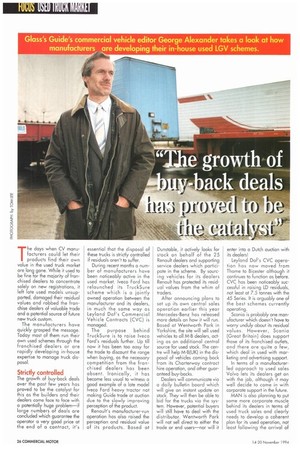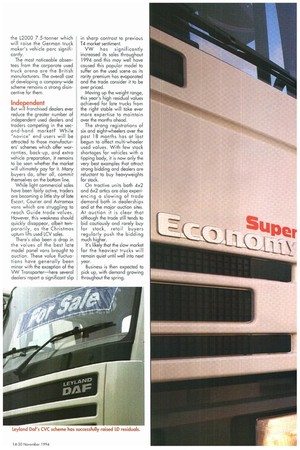T he days when CV manufacturers could let their products find
Page 28

Page 29

If you've noticed an error in this article please click here to report it so we can fix it.
their own value in the used truck market are long gone. While it used to be fine forthe majority of franchised dealers to concentrate solely on new registrations, it left late used models unsupported, damaged their residual values and robbed the franchise dealers of valuable trade and a potential source of future new truck custom.
The manufacturers have quickly grasped the message. Today most of them run their own used schemes through the franchised dealers or are rapidly developing in-house expertise to manage truck disposal.
Strictly controlled
The growth of buy-back deals over the past few years has proved to be the catalyst for this as the builders and their dealers come face to face with a potentially huge problem—if large numbers of deals are concluded which guarantee the operator a very good price at the end of a contract, it's essential that the disposal of these trucks is strictly controlled if residuals aren't to suffer.
During recent months a number of manufacturers have been noticeably active in the used market. Iveco Ford has relaunched its TruckSure scheme which is a jointly owned operation between the manufacturer and its dealers, in much the same way as Leyland Daf's Commercial Vehicle Contracts (CVC) is managed. The purpose behind TruckSure is to raise Iveco Ford's residuals further. Up till now it has been too easy for the trade to discount the range when buying, as the necessary competition from the franchised dealers has been absent. Ironically, it has become less usual to witness a good example of a late model Iveco Ford heavy tractor not making Guide trade at auction due to the slowly improving perception of the product. Renault's manufacturer-run operation has also raised the perception and residual value of its products. Based at Dunstable, it actively looks for stock an behalf of the 25 Renault dealers and supporting service dealers which participate in the scheme. By sourcing vehicles for its dealers Renault has protected its residual values from the whim of traders.
After announcing plans to set up its own central sales operation earlier this year Mercedes-Benz has released more details on how it will run. Based at Wentworth Park in Yorkshire, the site will sell used vehicles to all M-B dealers, acting as an additional central source for used stock. The centre will help M-B(UK) in the disposal of vehicles coming back from its Charterway contract hire operation, and other guaranteed buy-backs. Dealers will communicate via a daily bulletin board which will give an instant update on stock. They will then be able to bid for the trucks via the system. However, potential buyers will still have to deal with the distributor. Wentworth Park will not sell direct to either the trade or end users—nor will it enter into a Dutch auction with its dealers!
Leyland Dal's CVC operation has now moved from Thome to Bicester although it continues to function as before. CVC has been noticeably successful in raising LD residuals, not least at 7.5 tonnes with the 45 Series. It is arguably one of the best schemes currently operating. Scania is 'probably one manufacturer which doesn't have to worry unduly about its residual values. However, Scania (Great Britain) does support those of its franchised outlets, and there are quite a few, which deal in used with marketing and advertising support. In terms of a manufacturerled approach to used sales Volvo lets its dealers get on with the job, although it may well decide to come in with corporate support in the future. MAN is also planning to put some more corporate muscle behind its dealers in terms of used truck sales and clearly needs to develop a coherent plan for its used operation, not least following the arrival of the L2000 7.5-tanner which will raise the German truck maker's vehicle parc significantly.
The most noticeable absentees from the corporate used truck arena are the British manufacturers. The overall cost of developing a company-wide scheme remains a strong disincentive for them,
Independent
But wid franchised dealers ever reduce the greater number of independent used dealers and traders competing in the second-hand market? While "novice" end users will be attracted to those manufacturers' schemes which offer warranties, back-up, and extra vehicle preparation, it remains to be seen whether the market will ultimately pay for it. Many buyers do, after all, commit themselves on the bottom line.
While light commercial sales have been fairly active, traders are becoming a little shy of late Escort, Courier and Astramax vans which are struggling to reach Guide trade values. However, this weakness should quickly disappear, albeit temporarily, as the Christmas upturn lifts used LCV soles. There's also been a drop in the values of the best late model panel vans brought to auction. These value fluctuations have generally been minor with the exception of the VW Transporter—here several dealers report a significant slip in sharp contrast to previous T4 market sentiment.
VW has significantly increased its sales throughout 1994 and this may well have caused this popular model to suffer on the used scene as its rarity premium has evaporated and the trade consider it to be over priced.
Moving Up the weight range, this year's high residual values achieved for late trucks from the right stable will take ever more expertise to maintain over the months ahead.
The strong registrations of six and eight-wheelers over the past 18 months has at last begun to affect multi-wheeler used values. With few stock shortages for vehicles with a tipping body, it is now only the very best examples that attract strong bidding and dealers are reluctant to buy heavyweights for stock.
On tractive units both 4x2 and 6x2 artics are also experiencing a slowing of trade demand both in dealerships and at the major auction sites. At auction it is clear that although the trade still tends to bid cautiously and rarely buy for stock, retail buyers regularly push the bidding much higher. It's likely that the slow market For the heaviest trucks will remain quiet until well into next year. Business is then expected to pick up, with demand growing throughout the spring.






































































































